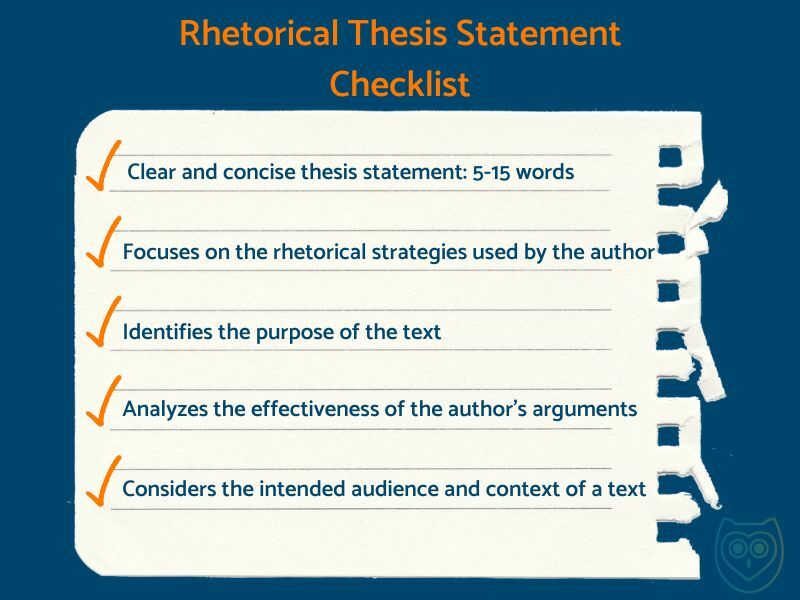
Because of its convoluted name, rhetorical analysis thesis statements might sound like a daunting thing to write. However, it is not that difficult to create as long as you can acknowledge all of its different components and form a proper thesis sentence. In this article, we will cover everything you need to construct a compelling rhetorical analysis statement for your essay. So let’s begin!
Rhetorical analysis thesis statements present a main argument about how a particular text (usually non-fiction) uses rhetorical devices to achieve a desired purpose. They can generally be found in rhetorical analysis essays or academic research papers used in college classes such as English, Political Science, or History. It is best to place it at the end of your introduction paragraph.
A thesis statement for rhetorical analysis has three main objectives:
Rhetorical analysis thesis statements are necessary for keeping you focused while you are writing your essay. It also benefits the reader because they can read it in the introduction and know exactly what the paper will be about.
Now we will cover the best practices for creating a proper argument needed for your thesis.

Before you begin writing, it is important to remember that it must be defensible. This means that it must be proven with evidence and you should not simply use your own opinion. It might be a good idea to write a rhetorical analysis essay outline to jot down ideas and sources that you will use in your paper. A thorough analysis should be done for your thesis. While you are reading the passage, take note of the rhetorical devices and strategies that the author uses. What specific choice did the author decide on in terms of rhetoric? You can include the names of the devices such as juxtaposition, alliteration, etc.
Once you have determined the different techniques utilized by the author, your next step is to find solid cases of those techniques within the text. This will serve as evidence for your thesis. The more evidence you can find to back up your claim, the better. While doing research, take note of how the example illustrates the rhetorical technique you are trying to prove.
After you have found sufficient evidence, start thinking about WHY the author decided to use them in the first place. Why did the author make these particular choices? What point was she trying to make?
One of the goals of the rhetorical thesis is to take apart an essay or literary work and break it down into its smaller components. You then determine how the parts come together to create a particular effect for the reader. What is going through your mind? Was the author trying to persuade you of something? Or was the purpose only to entertain?
Before you start a rhetorical analysis essay, you must take a firm position if you want your thesis statement to be effective. Of course, the reason why we even read literary works in the first place is because they can be interpreted in a myriad of ways. There might be several rhetorical methods the author uses in their work, but your job is to focus on ONE of them. You cannot convince the reader of your position if your ideas are all over the place. Choose what you think is the strongest point and stick with it.
Stuck with finding the right title? Get plenty of fresh and catchy topic ideas and pick the perfect one with PapersOwl Title Generator.
Use this list as a guide when you begin to write. This way, you can remain on task and create a thesis sentence that is coherent and clear to the reader.

Now that we have determined what goes into creating a thesis statement for a rhetorical essay, we can now discuss what is needed to write the argument itself.
A strong rhetorical essay thesis utilizes appeals. Appeals are tools that the author uses to earn the approval of the reader by playing to common experiences that we all have. The three types of appeals are pathos, ethos, and logos.
The pathos appeal uses language to conjure strong emotions in the reader like sympathy, anger, compassion, or sadness.
The ethos appeal uses the writer’s character and credibility to convince the reader that they are an expert on the topic being discussed.
Finally, the logos appeal calls to the reader’s logic and reasoning. You can employ evidence, statistics, and testimonies from other experts in the field to convince the reader of your position.
Utilizing all three types of appeals will guarantee that you create a rock-solid argument for your essay.
This should go without saying, but avoid plagiarism when writing a thesis for rhetorical analysis and be sure to properly cite your source.
You should also avoid bias when writing your rhetorical analysis essay thesis. The purpose of this type of essay writing is to be objective and to present evidence to convey the most logical argument possible. Lastly, you should try your best not to merely summarize a thesis for a rhetorical analysis essay. If you want to establish yourself as an expert on the topic, use facts and reasoning to your advantage to arrive at a believable conclusion.